Program 3: SICAJOB
Social Inequalities in CAncer survival : from care pathways to sustainable JOB retention
Program coordinators:
The SICAJOB program in the social and human sciences focuses on the life journey of patients to address two significant public health issues:
- Understanding the impact of social and geographical disparities: both in terms of cancer survival and professional pathways.
- Promoting sustainable employment for people affected by cancer:
Indeed, therapeutic advancements in cancer care have been accompanied by growing inequalities in access to care, with the expansion of medical deserts. Therefore, understanding the determinants of survival disparity is crucial to ensure that progress benefits everyone and everywhere. This is particularly relevant for women with high-risk breast cancer and poor prognosis, who often face challenges with returning to work. A significant proportion of cancer survivors return to work but encounter persistent difficulties in maintaining employment (such as treatment side effects and inadequate working conditions) in a constantly evolving work environment (digitalization, post-pandemic conditions). Making employment retention a priority requires tailored support and the promotion of working conditions that favor sustainable employment.
Leveraging our multidisciplinary expertise and previous experience with cancer survivors returning to work, our consortium, strengthened by strong national and international collaborations, has developed two key research axes to address health and professional inequalities at various scales, from population-level studies to individual patients, and from theory to practice:
- WP9 : Impact of social and access to car inequalities in BC: survival and return to work
Lead: Florence Molinié - WP10 : Sustainable job retention of cancer survivors after return to work (REWORK)
Lead: Yves Roquelaure
SICAJOB relies on a multidisciplinary consortium involving the medical and research teams of the Loire-Atlantique & Vendée Cancer Registry, CHU d’Angers, ICO, the Ester team at the IRSET laboratory, and the Jean Bodin Center.



